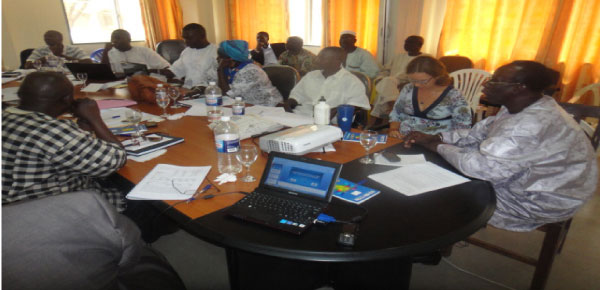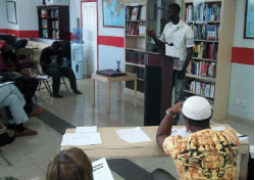
The five-year USAID/Ba-Nafa Project in The Gambia on 1 March 2012 invited a cross-section of fisheries stakeholders, government agencies and Non-Governmental Organizations at the Fisheries Department conference hall in Banjul to validate the Comparative Cost Study Report on Sole Fish between The Gambia and Senegal.
Speaking on the occasion, Amadou Saine, permanent secretary of the Ministry of Fisheries, Water Resources and National Assembly Matters, said The Gambia is blessed with abundant fisheries resources and that the sustainable management and utilization of these resources can yield substantial economic and social benefits to the people involved in the fisheries market value chain.
Sustaining this resource properly could also be of a great benefit to The Gambia Government in terms of increased revenue and foreign exchange earnings from exports of fish and fishery products, he said.
According to PS Saine, there are several economic, financial social and technical constraints that are impeding the sustainable development of the fisheries sector which needs to be addressed.
“This comparative cost study on the sole fish was commissioned by the USAID/Ba-Nafaa project to assess the impact of the cross-border trade of Gambian sole fish to Senegal and to fully understand the market context,” he said.
The opportunities for improving the marketing system to benefit more fully Gambian fisherman, fish processors and fish exporters should be looked into, the fisheries PS Saine noted.
He said although the study concentrated on sole fish, it is known that other high value fish species that are caught and landed in The Gambia are also finding their way across the border to fish factories in Dakar for processing and export as products of Senegal.
“The movement of fish across the border constitutes a huge economic loss for The Gambia and is our duty to try and understand the reasons why this is happening,” he said.
“We are highly appreciative of the USAID/Ba-Nafaa Project support to the Fisheries Department and the fishing industry to meet the eligibility criteria for certification of the sole fishery by the Marine Stewardship Council (MSC).
“This positive development should provide enough motivation for us to safeguard the precious fisheries resources and ensure that they are managed and utilised in a rational and sustainable manner that will yield optimal benefits for The Gambia.”
For his part, Ousman Drammeh, project manager of the USAID/Ba-Nafaa, said in 2010 the USAID/Ba-Nafa project commissioned a value chain assessment of the sole fishery which revealed that an unknown quantity of sole fish caught and landed in The Gambia is being transhipped to Senegal for processing in Senegalese fish factories for subsequent export.
That was the reason why this comparative study was commissioned to better understand the market context of the cross-border trade in sole fish and the reasons for the trade, he said, adding that the USAID /Ba-Nafa project is here to assist and complement Gambia Government’s efforts at meeting its fisheries management and development objectives since the start up of the project two years ago.
He added that the project has been supporting the Fisheries Department and fishing industry to meet the eligibility criteria for certification of sole fishery by MSC, and there is a high probability that the eligibility criteria will be met during the course of this year 2012.
Nfamara Dampha, director of Fisheries, said the MSC eco-label if awarded will open new market opportunities for Gambian sole fish and already there is evidence of this, as a chain of 100 fish retailers in Germany has raised money to support the certification process.
“Several fish retailers in the UK have also expressed interest to purchase the Gambian sole fish when the eco-label is awarded.”
Moustapha DEME, the lead consultant, said the methodology of the study included literature review, focus group discussions and interviews, and consultations both in The Gambia and Senegal, survey in The Gambia, analysis of data and report writing.
He added that a holistic and integrated approach to the study was adopted and all administrations involved directly or indirectly to sole fish trade have been visited.
Read Other Articles In Article (Archive)


